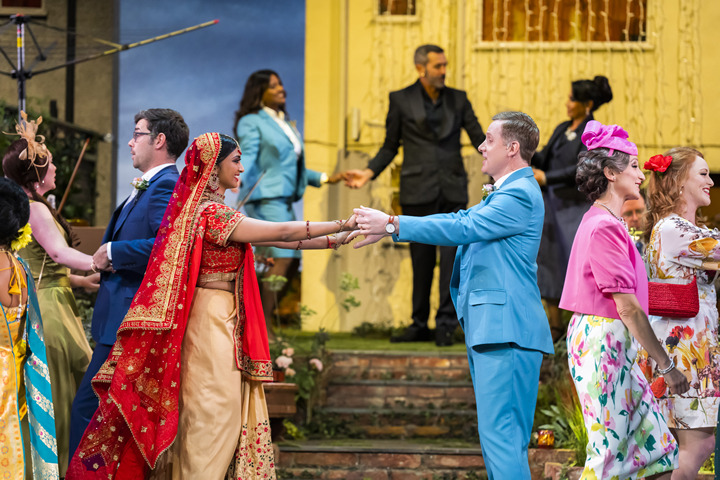| Opera Reviews | 28 April 2024 |
A joyous and charming reimagination of the Orpheus mythby Catriona Graham |
|
Monteverdi/Degun: Orpheus |
|
 |
|
|
Picture the back garden of a pre-war, end-of-terrace council house, well cared for, low stone walls surrounding a lawn, with steps down to it, roses growing up trellis boundary fences and a profusion of flowering herbaceous plants. A trumpeter blows a recognisable fanfare and is immediately joined by the more fluid sound of the sitar and other Indian instruments. Two women enter, carrying tealights, one in floral frock (Amy Freston) and matching pink jacket, the other in green and gold sari (Deepa Nair Rasiya), both singing as Music. In Orpheus, Opera North reimagines Monteverdi’s Orfeo as a marriage of east and west, with a Caucasian groom and a South Asian bride. He sings Monteverdi’s music in Italian, she sings new Indian music composed by Jasdeep Singh Degun, informed by Monteverdi but set to traditional Indian classical taals. The musicians are on stage, guests at the wedding, on platforms over the flower beds. The singing is superb, whether it is entertainingly competitive singing from Chiranjeeb Chakraborty and Vijay Rajput, as they vie to challenge Nicholas Watt’s Orpheus (with fiddle, not lyre) with ever more difficult embellished and ornamented vocal phrases to imitate, or the blunt interruption of Kezia Bienek’s Sylvia, bringing the news of Eurydice’s death. If Sanchita Pal’s lowest notes are sometimes lost in the large space of a Western theatre, her higher notes are crystal clear and her expressive face and gestures convey the joy of Eurydice’s family and friends on the occasion of the wedding. Kaviraj Singh abandons his santoor to sing Caronte, the boatman, who is lulled by Orpheus’ singing, letting the living Orpheus sneak past him into the land of the dead. Only, in this production, the journey is not topographical, it is psychological and emotional. Orpheus is working through the grief of his bereavement with the help of those same wedding guests, his family and friends, now extended to include Eurydice’s, who are working through their own grief and loss. When Prosperina pleads Orpheus’ case with her husband Pluto, Chandra Chakraborty’s gently flirtatious entreaties could wheedle blood from the proverbial stone and it is unsurprising that Dean Robinson concedes. So Orpheus has a chance to get Eurydice back. We see Ashnaa Sasikaran, no longer in the gorgeous red and gold of her wedding sari but in a yellow floral-patterned frock and embroidered white cardigan; her movements seem to indicate her enclosure in a confined space. Coming to Orpheus, they circle back to back, but Orpheus can’t resist that glimpse and she leaves; his mother and mother-in-law join him to console him, starting a wheel which the other guests join, with Orpheus at its centre. Leslie Travers costumes and set are so richly colourful and enhanced by Jackie Shemesh’s atmospheric lighting. The choreography by Urja Desai Thgakore, despite the relatively confined space, is eloquent and there is a telling credit in the programme for Head Gardener – Ali Allen. Director Anna Himali Howard creates a genuinely happy – and sorrowful – family celebration. But it is the music, both instrumental and vocal, which makes this such a magical performance. The Indian classical singers join with the Western singers for the choruses, which creates an interesting texture, and there is some truly virtuosic playing from the instrumentalists, as well as multi-tasking from music director Laurence Cummings, who sings a few lines as well as playing and directing from the harpsichord, while fellow music director Jasdeep Singh Degun plays the sitar. The myth of Orpheus is of the greatest poet and musician, who could charm anyone and anything with his music. Anyone would be charmed by this production. |
|
Photo © Tristram Kenton |
|







